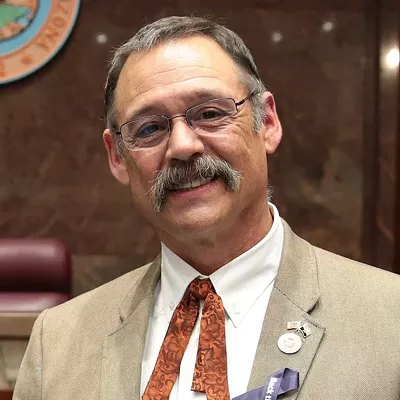Phil Lopes retired (as the minority leader) when he reached his term limit in the Arizona House of Representatives and moved his focus to working with the Progressive Democrats of America's Tucson chapter (pdamerica.org). He's a staunch supporter of Clean Elections, which—for now—allows candidates to receive public funds to finance their campaigns for state office. But if voters this year approve SCR 1025, which was passed by the Arizona Legislature and is called the "Stop Public Money for Political Candidates' Campaigns Act," the Clean Elections system would come to an end.
Why do you support Clean Elections?
All four times, I ran clean, as opposed to soiled, because of two reasons: One, it allowed me to reach out to lots and lots of people to be involved in my campaign. That allows more participation by regular people—by the Circle K clerk, by my neighbor who's a laborer—because candidates before this weren't interested in the $5 contribution, but the $250 one. Two, I can spend my time as a candidate and elected official seeing problems and coming up with solutions, not fundraising. Once I got Clean Elections funding, I focused my total campaign on the issues. Money was out of the equation.
What would you say to people who link the polarization of the Legislature to Clean Elections allowing ideologues to run successful campaigns?
People who say that need to go back and take a basic research class and understand the difference between correlation and causation. My neighbor, who is a landscaper, a small businessman, is not looking to push an ideology when he gives that $5. That's not my experience. But people with big money, they do have an ideology. Clean Elections affects the financing mechanism of campaigns, not the issues. Big contributors under the traditional system are looking for access to elected officials, so saying Clean Elections is responsible for more ideology is disingenuous.
Is there anything you'd change about Clean Elections?
Do I think Clean Elections is perfect? No, I don't. Its aim, for example, was that more minorities and more females would get elected. I'm not sure that's happened. Would I make some changes? Yes. There have been people who've played games with Clean Elections. A rich guy funds his own campaign so that the other two candidates can get the matching funds—those sorts of shenanigans should not be allowed.
Do you agree with the statement that Clean Elections costs taxpayers money?
The box on my income tax that allows me to give $5 to Clean Elections raises about $8 million for Clean Elections. However ... Clean Elections must give back to the general fund any money that they don't spend in a given election cycle, and they give back more than the $8 million that (taxpayers) give. To say that it is using taxpayer money is disingenuous. They are getting back more than what they are putting into it, because most of it is financed by a fee on civil fines. That's how most of the money is getting there.
Do you think Clean Elections helps one party over the other?
We're not doing it to elect Democrats. Our primary reason for supporting Clean Elections is because we believe really strongly in it. ... It's about keeping big money (away from) elected officials. Without it, candidates and elected officials who are viewed as carrying the water for those big-money affiliates would get elected.
How do you see Clean Elections being impacted by the Progressive Democrats?
We are going to fight this referendum that's going to be on the ballot in 2012. I think we can be a little bit more vocal about our support for Clean Elections, because the polls say we can win. The polling in Arizona favors Clean Elections. The Republicans are going to throw a lot of money at this referendum, but we're working with the people in Phoenix (the Democrats in the Legislature) to wage the war.
If everyone ran "clean," what would happen?
As far as what gets passed and what gets debated, I'm not sure it would have a huge impact. But (the system) would not be beholden to big-money interests. That's where the impact of Clean Elections on the Legislature is important. ... If that's understood to Joe Sixpack that I'm not more beholden to the Chamber of Commerce than I am to (him), it gives (him) more confidence about the governance of the state.






